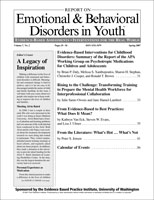Implementing an Evidence-Based Behavioral Family Intervention With a Low-Income, Urban, African-American Population: Reflections, Challenges, and Recommendations
Author: Karia Kelch-Oliver, Ph.D., L.M.F.T..; Chaundrissa Oyeshiku Smith, Ph.D..
Source: Volume 09, Number 04, Fall 2009 , pp.85-90(6)

< previous article |next article > |return to table of contents
Abstract:
Young children who exhibit disruptive behaviors are at an increased risk for more severe disorders in adolescence and later in adulthood, with higher rates seen in children from urban, low-income neighborhoods. Prevention and treatment efforts are therefore needed to decrease problematic outcomes. Parent training programs—specifically, evidence-based behavioral family interventions—have been effective in preventing and reducing disruptive behaviors in children. This paper discusses the challenges of implementing an evidence-based parent training program known as the Triple P-Positive Parenting Program within a community-based outpatient mental health clinic that serves a primarily urban, low-income, African-American population. The challenges experienced in the program are consistent with previous research with economically disadvantaged families. Implications of the barriers associated with parental participation are discussed, and recommendations are made for future implementation of evidence-based parenting programs with African-American populations.Keywords:
Affiliations:
1: Emory University School of Medicine; 2: Emory University School of Medicine.